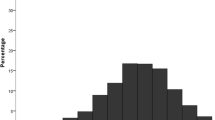Abstract
The configuration of one’s social environment influences the course and experience of depression. Research suggests that experiencing depression is associated with stigmatisation and the concomitant experiencing of discrimination across many facets of social life. This is identified as a particularly important factor in rural communities. Contemporary work is absent in relation to understanding the stigma towards depression in Ireland, and its manifestation in rural Ireland specifically. Evidence is presented which suggests that depression is a significant source of stigmatisation in this setting, and that entrenched views centring upon disability and fear are prevalent.
Similar content being viewed by others
References
Barney, L. J., Griffiths, K. M., Christensen, H., & Jorm, A. F. (2009). Exploring the nature of stigmatising beliefs about depression and help-seeking: Implications for reducing stigma. BMC Public Health, 9, 1–11. https://doi.org/10.1186/1471-2458-9-61.
Barney, L. J., Griffiths, K. M., Jorm, A. F., & Christensen, H. (2006). Stigma about depression and its impact on help-seeking intentions. Australian & New Zealand Journal of Psychiatry, 40(1), 51–54.
Barry, M. M., Doherty, A., Hope, A., Jane, S., & Kelleher, C. C. (2000). A community needs assessment for rural mental health promotion. Health Education Research, 15(3), 293–304.
Braun, V., & Clarke, V. (2006). Using thematic analysis in psychology. Qualitative Research in Psychology, 3, 77–101.
Byrne, P. (2000). Stigma of mental illness and ways of diminishing it. Advances in Psychiatric Treatment, 6(1), 65–72. https://doi.org/10.1192/apt.6.1.65.
Eagles, J. M., Carson, D. P., Begg, A., & Naji, S. A. (2003). Suicide prevention: a study of patients’ views. The British Journal of Psychiatry, 182(3), 261–265. https://doi.org/10.1192/bjp.02.300.
Goffman, E. (1963). Stigma: Notes on the management of spoiled identity. London: Penguin Books Ltd.
Goldberg, D., & Goodyer, I. (2005). The origins and course of common mental disorders. London: Routledge.
Griffiths, K. M., Christensen, H., Jorm, A. F., Evans, K., & Groves, C. (2004). Effect of web-based depression literacy and cognitive-behavioural therapy interventions on stigmatising attitudes to depression: Randomised controlled trial. The British Journal of Psychiatry, 185(4), 342–349. https://doi.org/10.1192/bjp.185.4.342.
Herman-Kinney, N. J. (2003). Deviance. In L. T. Reynolds, & N. J. Herman-Kinney (Eds.), Handbook of symbolic interactionism. Oxford: Alta Mira Press.
Lauber, C., Nordt, C., Falcato, L., & Rössler, W. (2004). Factors influencing social distance toward people with mental illness. Community Mental Health Journal, 40(3), 265–274. https://doi.org/10.1023/B:COMH.0000026999.87728.2d.
Lazowski, L., Koller, M., Stuart, H., & Milev, R. (2012). Stigma and discrimination in people suffering with a mood disorder: A cross-sectional study. Depression Research and Treatment. https://doi.org/10.1155/2012/724848.
Link, B. G., & Phelan, J. C. (2001). Conceptualizing stigma. Annual Review of Sociology, 27, 363–385.
McKeon, P., & Carrick, S. (1991). Public attitudes to depression: a national survey. Irish Journal of Psychological Medicine, 8, 116–121.
McNair, B., Highet, N., Hickie, I., & Davenport, T. A. (2002). Exploring the perspectives of people whose lives have been affected by depression. Medical Journal of Australia, 20(176 Suppl), S69–76.
McPherson, M., Smith-Lovin, L., & Cook, J. M. (2001). Birds of a feather: Homophily in social networks. Annual Review of Sociology, 27, 415–444. https://doi.org/10.2307/2678628.
Pompili, M., Mancinelli, I., & Tatarelli, R. (2003). Stigma as a cause of suicide. The British Journal of Psychiatry, 183(2), 173–174. https://doi.org/10.1192/bjp.183.2.173-a.
Sirey, J. A., Bruce, M. L., Alexopoulos, G. S., Perlick, D. A., Friedman, S. J., & Meyers, B. S. (2001). Stigma as a barrier to recovery: Perceived stigma and patient-rated severity of illness as predictors of antidepressant drug adherence. Psychiatric Services, 52(12), 1615–1620.
Webber, M., Huxley, P., & Harris, T. (2011). Social capital and the course of depression: Six-month prospective cohort study. Journal of Affective Disorders, 129(1–3), 149–157.
Acknowledgements
This study was supported by the School of Nursing and Midwifery, Trinity College Dublin. Permission to complete this research was sought from, and granted by the Ethics Committee of the Faculty of Health Science, Trinity College Dublin.
Author information
Authors and Affiliations
Corresponding author
Ethics declarations
Conflict of interest
The author knows of no conflict of interest.
Appendix– Semi-Structured Interview Schedule
Appendix– Semi-Structured Interview Schedule
Opening of Interview
Please tell me something about yourself, where you are from, what you do…
Topic Guide
-
Perceived community knowledge of depression—manifestation, causes, and treatment possibilities.
-
Origins of community knowledge of depression.
-
Relationships with those with depression.
-
Perceived hypothetical comfort/discomfort of others with those with depression—friend, colleague etc…
-
Views on stigma attached to depression.
-
Depression seen as a form of weakness?
-
Understood local rural community responses to depression/mental health issues.
-
Depression as source of gossip in rural communities - familiarity with colloquial terms for depression.
-
Perceived local knowledge and origins of above.
-
Practical responses to depression stigma in the community—social distancing?
-
Perceived practical (day-to-day), social and professional implications of potential discrimination.
-
Implications for potential individual social support structures.
Example of Probes
-
And why do you think that is?
-
What do you think might be driving this behaviour/thinking?
-
Can you think of any instances of this in your own community?
-
That’s really interesting, have you any other examples of this?
Conclusion of Interview
-
Offer opportunity to revisit all aspects of interview.
-
Reiterate researcher contact details.
-
Ask if any queries about any aspect of the study/their participation.
-
Thank for participation.
Rights and permissions
About this article
Cite this article
Kennedy, C. Stigma Towards Depression in Rural Ireland: A Qualitative Exploration. Community Ment Health J 54, 334–342 (2018). https://doi.org/10.1007/s10597-017-0200-1
Received:
Accepted:
Published:
Issue Date:
DOI: https://doi.org/10.1007/s10597-017-0200-1



